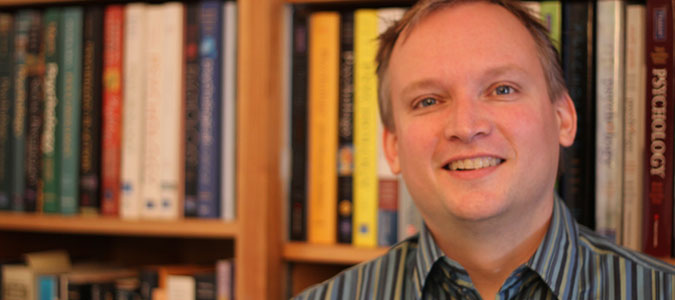Master teacher mastering change
Even with the Master Teacher award in hand, Lorin Elias said he still doesn’t think he has mastered the craft of teaching.
By Kris Foster "This is not being coy," said Elias who received the highest U of S teaching award at fall convocation. "The landscape of teaching is evolving faster than we are. We are seeing textbooks being phased out and replaced with online courses. So much is in flux. Today's student has a very different toolkit and skill set than the student of 1998 when I started this job. Cellphones and laptops are ubiquitous in the classroom, and they can be used to contribute to the educational experience, not just distract from it. There is no comfortable spot where I say to myself, ‘I've got this.'"
"This is not being coy," said Elias who received the highest U of S teaching award at fall convocation. "The landscape of teaching is evolving faster than we are. We are seeing textbooks being phased out and replaced with online courses. So much is in flux. Today's student has a very different toolkit and skill set than the student of 1998 when I started this job. Cellphones and laptops are ubiquitous in the classroom, and they can be used to contribute to the educational experience, not just distract from it. There is no comfortable spot where I say to myself, ‘I've got this.'"
Before Elias, professor and associate head of the Department of Psychology, credits himself for any teaching accolades, he first points to the content he teaches. "I am lucky that I teach psychology. I am spoiled. If you teach psychology and relate it to everyday life it is easy and fun. I try to make the content personal, relate it to behaviour students are surrounded by in everyday life. I imagine that is more difficult in some other disciplines."
What Elias does, however, is tailor the learning environment for the students in it. "I don't have one teaching philosophy. How I teach varies tremendously. It is radically different for 200 first-year students than for 11 students in a 400-level class. I need to keep the attention of one class and challenge the other."
Not to mention how he uses online courses. "I had one student in Switzerland who was trying to be a professional hockey player. Online courses are a great way to keep these students."
For Elias, the students he teaches are priority number one. "Everyone on campus, we all specialize to some degree. Some specialize in administration, some in research and for some of us, we are teachers. I love teaching. The reward cycle for teaching is much shorter than research. In a classroom you can see the impact you have on their faces and you can change their views in a relatively short time. The reward cycle in publishing is typically much longer."
Although Elias considers himself a specialist in teaching, he also balances a full research agenda—one Tri-Council-funded project focuses on neuropsychology related to biases and spatial attention.
Elias is also about to delve into the administrative world too, as he takes on the role of department head in psychology this January.
"It is a little ironic that I am becoming department head because I would rather be in the classroom. I identify more with instructors, but the roles aren't mutually exclusive. Administration allows teaching in class and labs, and exploration and research to happen. It really is a privilege to be working here."

